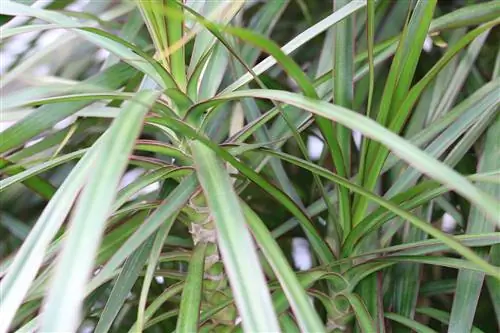- Author admin caroline@plants-knowledge.com.
- Public 2023-12-17 03:39.
- Last modified 2025-01-24 12:45.
Hardly any houseplant is as popular as the dragon tree, because it is not only pretty to look at, but also very easy to care for. However, the Dracaena should be consumed with a certain degree of caution because it is slightly toxic! You can find out in this article which symptoms can occur and for whom the plant poses an increased risk!
Dragon trees contain saponins
The popular dragon tree is actually poisonous, although only slightly. Because the Dracaena contains the toxic substance “saponin” in all parts of the plant. This is a secondary plant substance that is also found in vegetables. In small quantities, saponins are generally harmless because they are largely absorbed in the human digestive tract. However, the situation is different when large quantities are consumed. Since the Dracaena contains saponins in a high concentration, no parts of the plant should be consumed, otherwise symptoms of poisoning can occur.
Possible symptoms of poisoning
Consuming a large amount of saponins can lead to various symptoms of poisoning. Affected people very often suffer from shortness of breath and malaise, but also from cold sweat. In addition, the following symptoms may occur:
- Vomiting
- Diarrhea
- Dizziness and circulatory disorders
- Nausea
Danger to children
In principle, adults hardly have to fear any adverse effects when consuming (small) amounts of saponins. However, the situation is different for toddlers and children, as they experience the side effects much more severely due to their low body weight. Additionally, children are naturally at higher risk of poisoning because of their tendency to put things in their mouths. For this reason, children should learn as early as possible that the plant is taboo.

Allergy / Asthma
There is also an increased risk for asthmatics and people with allergies, as they often react very sensitively to different substances - and not just when consumed! If you have an existing allergy or asthma, any symptoms can also occur through skin contact. It is also possible that affected people experience he alth problems due to the mere presence of the tree. These include, among others:
- Skin irritation, such as redness or rash
- Difficulty breathing caused by fumes
Note:
Reactions are generally more likely or quicker in confined spaces.
Danger to pets
The popular houseplant is also poisonous to pets, although caution should be exercised especially around cats and dogs. Because they also feel any side effects more acutely due to their low body weight (as is the case with children). As a rule, the animals are less interested in eating the dragon tree because its leaves taste bitter. In addition, a little bit of nibbling is usually not associated with any he alth problems. However, caution is advised, because consuming large quantities can lead to the following symptoms of poisoning in furry friends:
- Diarrhea and/or vomiting
- Cramps
- Irritation of mucous membranes
- Heavy salivation
- Gum inflammation
Tip:
Dogs and cats often find it very exciting to play with the leaves of the dragon tree. It is therefore advisable to always offer the animals alternative employment opportunities.






